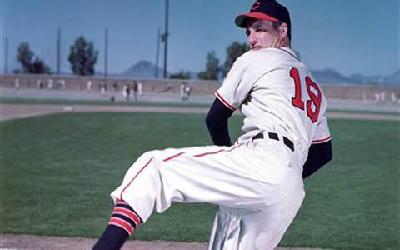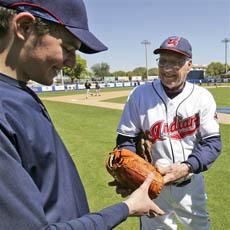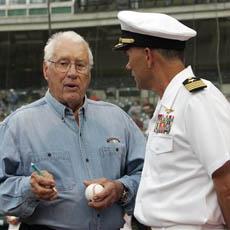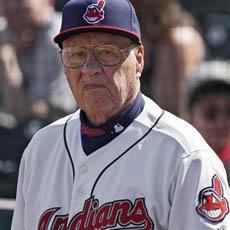
BARBARA KLEIN: I'm Barbara Klein.
STEVE EMBER: And I'm Steve Ember with PEOPLE IN AMERICA in VOA Special English. Today we tell about Bob Feller, one of the best pitchers in the history of American baseball.
(MUSIC)
CHRISTOPHER CRUISE: "I didn't know much. I just reared back and let them go. Where the ball went was up to heaven. Sometimes I threw the ball clean up into the stands."
BARBARA KLEIN: Those were the words of Bob Feller, talking about his pitching. Robert William Andrew Feller was born in 1918 in the small town of Van Meter, Iowa. He grew up on his family's farm nearby. When he was not working in the fields, Bob was throwing a rubber ball against the side of a barn. Or playing catch with his father.
CHRISTOPHER CRUISE: "My father loved baseball and he cultivated my talent. I don't think he ever had any doubt in his mind that I would play professional baseball someday."

STEVE EMBER: Bob played baseball in high school. At the age of 16, he secretly signed an agreement with a major league baseball team, the Cleveland Indians. He received one dollar and a baseball signed by the Cleveland players. Bob Feller became a professional baseball player at the age of 17 while he was still in high school. He never pitched in the minor leagues, as most players do today.
In July of 1936, he pitched in an unofficial game against the St. Louis Cardinals. He struck out eight batters. None of them were able to hit the balls that Feller threw. The next month, he struck out 15 batters in a game against the St. Louis Browns.
BARBARA KLEIN: In September, Bob Feller pitched against the Philadelphia Athletics. He tied the major league record of striking out 17 players in one game. Before his first season had ended, the New York Times reported that Bob Feller's name was "on the tongues of a million fans." He was said to be the best-known young person in America.
At the end of the season, Feller returned to his hometown for his last year of high school. NBC radio broadcast his graduation from Van Meter High School nationwide. He was on the cover of Time magazine at the age of 18.
STEVE EMBER: From the late 1930s to the late 1940s, Bob Feller was called the best pitcher in major league baseball. He threw the ball harder than any other pitcher of his time. He was known for his fastball. People sought to measure its speed using different methods. It was measured at between 157 and one 172 kilometers an hour.
One sportswriter described the effect the young pitcher had on other players. He wrote: "They were taking the pre-game exercises when the kid kicked his left foot high and delivered the first warm-up pitch. All over the field, action ceased. Nobody said anything. Everybody just stood still and watched."
Because of his fastball, Bob Feller had several nicknames, including "Rapid Robert" and "Bullet Bob." He won 107 major league games before his 23th birthday. Experts said Bob Feller was baseball's most exciting player since Babe Ruth in the 1920s.

CHRISTOPHER CRUISE: "When I picked up the ball and it feels nice and light and small, I know I'm going to have a good day. But if I pick it up and it's big and heavy, I know I'm liable to get into a little trouble."
(MUSIC)
BARBARA KLEIN: Bob Feller pitched on the final day of the 1938 season against the Detroit Tigers. He struck out 18 hitters to set a new major league record. Today, the record is 20. In 1940, he became the first American league pitcher to throw a complete game no-hitter on opening day, the first game of the season.
Then, on December 7th, 1941, Japanese forces attacked the American naval base at Pearl Harbor, Hawaii. The United States entered World War Two. Two days later Bob Feller halted his career to join the Navy. He was the first major league baseball player to volunteer for military service.
He served as the chief of an anti-aircraft gunnery crew on the battleship USS Alabama. He missed three full baseball seasons and most of a fourth.
STEVE EMBER: Bob Feller returned to baseball late in 1945. He recorded his best season the next year when he won 26 games. In 1947, Feller injured his right arm. He was never the same pitcher again.
The Cleveland Indians won the American League championship in 1948. So Feller achieved his dream of pitching in the World Series. The Indians won the World Series against the Boston Braves, four games to two. Feller started both games that the Indians lost. However, three years later, he was the best pitcher in the American League, winning 22 games.
(MUSIC)
BARBARA KLEIN: In the 1950s, Bob Feller helped organize the Major League Baseball Players Association. He served as the group's first president. He helped establish a pension plan to provide money for retired baseball players.
Feller retired from baseball in 1956. He won 266 games in 18 seasons with the Cleveland Indians. He led the American League seven times in strikeouts and six times in victories. He pitched three games without any of the batters getting hits. And he pitched a record 12 games when he permitted only one hit.
Some baseball experts believe that he might have won 350 games and set the strikeout record if he had not spent several years in the military. But Feller never regretted his choice. In 2001, he said:
CHRISTOPHER CRUISE: "You'll never hear me complain about my time in the service. Baseball is insignificant when it comes to war."

BARBARA KLEIN: Feller was once asked: "What is the most important game you ever won?" He answered: "World War Two."
(MUSIC)
STEVE EMBER: Bob Feller was elected to the Baseball Hall of Fame in Cooperstown, New York, in 1962. Seven years later, professional baseball celebrated its 100th anniversary at the All-Star Game. Feller was honored as baseball's greatest living right-handed pitcher.
He spoke out about protecting baseball's standards of fairness. He opposed admitting players to the Hall of Fame if they had used performance-enhancing drugs.
BARBARA KLEIN: Bob Feller continued his connection with the Cleveland Indians as a "goodwill ambassador." He appeared at the team's spring training games. He helped train young pitchers. He played catch in the field while wearing his easily recognizable number 19 uniform. He also talked to baseball fans, often signing balls or pictures of him as a player. Feller often appeared at the team's "Fantasy Camps." This is where baseball fans pay a lot of money to spend a week playing baseball with former players.
In 2009, at the age of 90, he put on his Indians uniform one more time. He pitched to three batters in the first Baseball Hall of Fame Classic, a game in Cooperstown between former major leaguers.
Dennis Hoffman wrote about him in his book "Legends of the Ball." He asked the great pitcher: "If you could relive any one of the many great moments in your life, which one would it be?" Feller answered: "Playing catch with my dad between the red barn and the house."
STEVE EMBER: Bob Feller died of leukemia in 2010 at the age of 92. A statue of him stands outside Progressive Field, the home of the Cleveland Indians. After his death, Indians owner Larry Dolan said Feller was an important part of the team and the city: "He is Cleveland, Ohio."
Several people wrote on Facebook about what Bob Feller meant to them. Here are some of those comments.
"I saw him pitch to several batters at an old-timers game in Florida a few years back. Even then, at age 88, he could still put one in there."
"I almost melted when I shook his hand at a minor league game once. My childhood hero. An athlete among athletes."
"A Cleveland hero, a baseball hero and an American hero. Thanks, Bob."
(MUSIC)
BARBARA KLEIN: This program was written by Shelley Gollust and produced by Dana Demange. Christopher Cruise was the voice of Bob Feller. I'm Barbara Klein.
STEVE EMBER: And I'm Steve Ember. You can find scripts and audio of our programs at voaspecialenglish.com. We are also on Facebook, Twitter and YouTube at VOA Learning English. Join us again next week for PEOPLE IN AMERICA in VOA Special English.
no-hitter: a complete game in which a pitcher yields no hits to the opposing team 【棒】无安打比赛
strikeout: in baseball, a situation in which the player who is supposed to be hitting the ball is out and has to stop because he or she has tried to hit the ball three times and failed (三击不中)出局
leukemia: a malignant progressive disease in which the bone marrow and other blood-forming organs produce increased numbers of immature or abnormal leukocytes. These suppress the production of normal blood cells, leading to anemia and other symptoms 白血病(俗称血癌)
Remembering six people lost in 2010
Harry Houdini, 1874-1926: the great escape artist
Flannery O'Connor, 1925-1964: she told stories about people living in the American South
O. Henry's Austin home a museum for over 75 years
(来源:VOA 编辑:崔旭燕)
